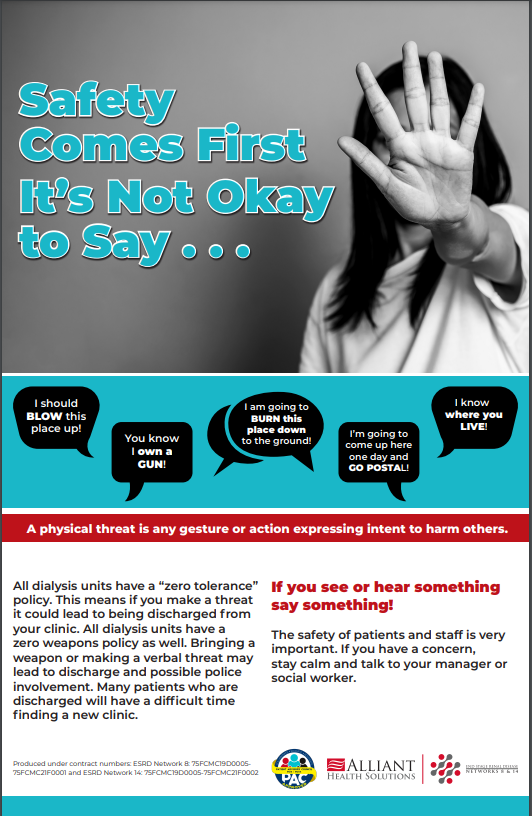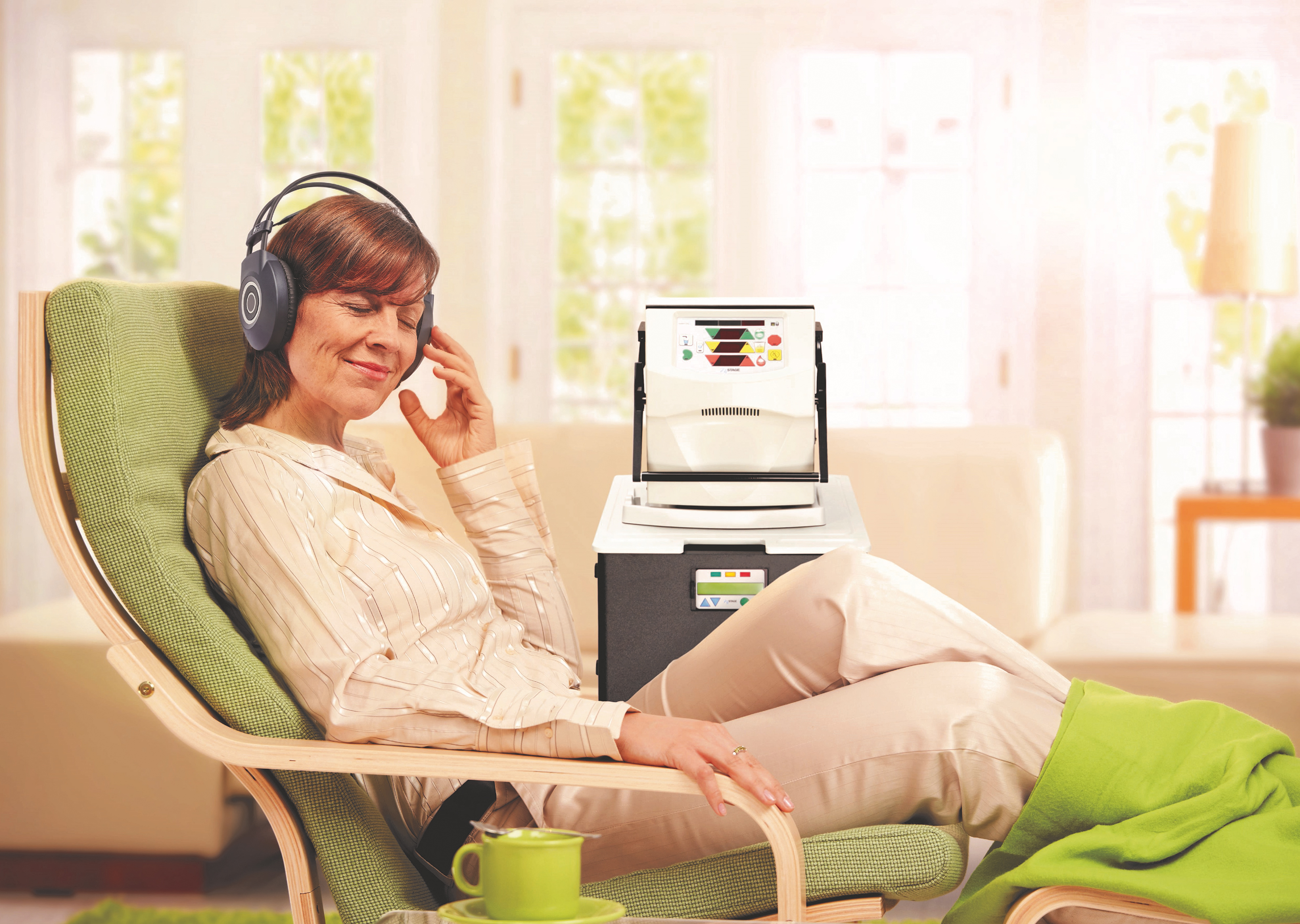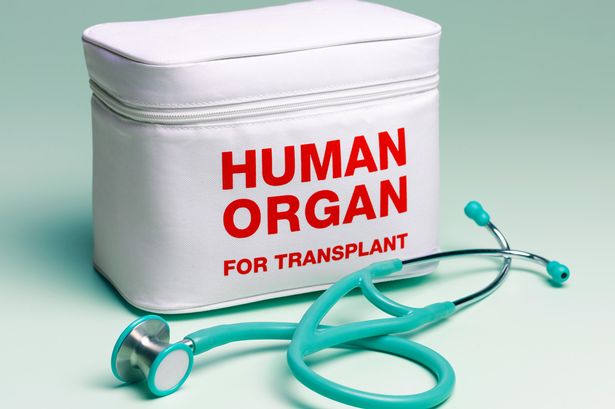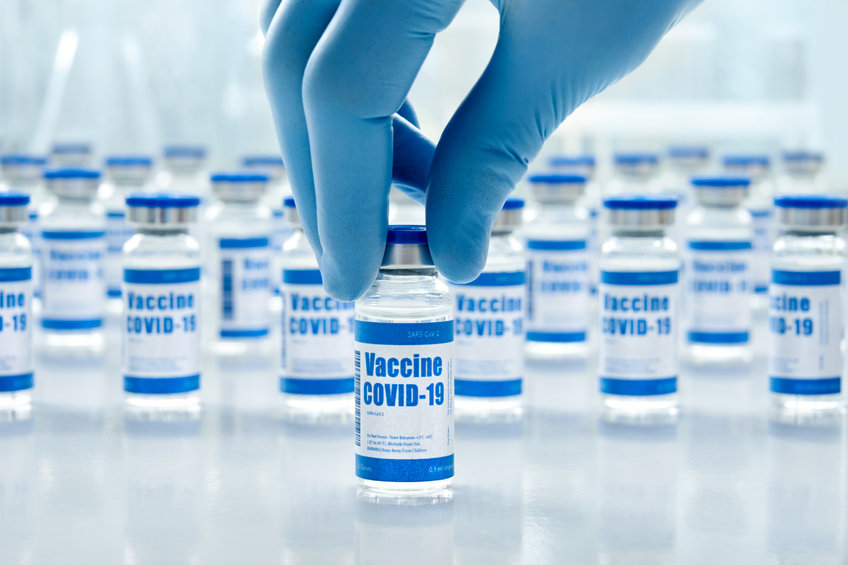This ESRD facility monthly newsletter highlights the latest ESRD insights and resources. Our goal is to provide you with a resource that makes it easy for you to stay on top of trends and support you in providing the best possible care for those you work with and serve.
In This Issue:
“Don't raise your voice. Improve your argument.” — Desmond Tutu
 In follow up to our July newsletter, two resources have been distributed to all facility social workers: Safety Comes First, a reminder to patients about the importance of choosing words carefully, and a letter to patients regarding the critical staffing shortages that exist in many areas, asking for patience and understanding. The Safety Comes First flyer can be accessed here in English and here in Spanish if you need an additional copy.
In follow up to our July newsletter, two resources have been distributed to all facility social workers: Safety Comes First, a reminder to patients about the importance of choosing words carefully, and a letter to patients regarding the critical staffing shortages that exist in many areas, asking for patience and understanding. The Safety Comes First flyer can be accessed here in English and here in Spanish if you need an additional copy.On a lighter note, the closing days of summer and the beginning of school point toward Labor Day and football season. Here is a quick, simple appetizer that you may want to try.
Behavioral Health
 According to the 2019 USRDS Annual Data Report, there were 2,894 incident ESRD patients > 65 years of age per million persons (pmp) as of December 31. To put this in perspective, there were 757 incident ESRD patients < 65 years of age pmp. At times, the PHQ9 just does not “fit” these older patients well enough to properly detect depression. The geriatric depression scale is a better fit for this. Click here to learn more about this tool and access a copy of the one-page form.
According to the 2019 USRDS Annual Data Report, there were 2,894 incident ESRD patients > 65 years of age per million persons (pmp) as of December 31. To put this in perspective, there were 757 incident ESRD patients < 65 years of age pmp. At times, the PHQ9 just does not “fit” these older patients well enough to properly detect depression. The geriatric depression scale is a better fit for this. Click here to learn more about this tool and access a copy of the one-page form.
CMS Goals:
- Increase the number of patients accurately screened and treated by a mental health professional for depression.
- Ensure that facilities report depression screening in EQRS.
Network 8 Contact: ericka.webb@allianthealth.org
Network 14 Contact: ednesha.smith@allianthealth.org
Home Dialysis
 When it comes to home dialysis, the two biggest barriers reported by our patients are lack of a care partner and not wanting to undergo another surgery for peritoneal dialysis. A great option for these patients is Solo Home Hemodialysis. Solo HHD is an underutilized home modality, but it offers many benefits. You can use the resources below to learn more about the benefits of Solo home hemodialysis.
When it comes to home dialysis, the two biggest barriers reported by our patients are lack of a care partner and not wanting to undergo another surgery for peritoneal dialysis. A great option for these patients is Solo Home Hemodialysis. Solo HHD is an underutilized home modality, but it offers many benefits. You can use the resources below to learn more about the benefits of Solo home hemodialysis.
CMS Goals
- Increase prevalent patients added to a home modality.
- Increase incident patients added to a home modality.
- Increase the use of telemedicine for home modality in rural areas.
Resource:
Home Dialysis Contact: maryam.alabood@allianthealth.org
Hospital Admissions, Readmissions, and Emergency Visits

Facilities and patients are affected by hospitalizations and readmissions quite often. Readmission can result in poor health outcomes, increased anxiety, frustration, and loss of trust in the health care system for our patients. Similarly, readmission affects the providers as it may cause increased physical demand, stress, fatigue, communication issues, and burnout. Click on the resource below to learn how health equity strategies can help organizations reduce hospital readmissions.
CMS Goals
-
Decrease hospital readmissions.
-
Decrease hospital 30-day unplanned readmissions.
-
Decrease emergency department visits.
-
Decrease COVID-19 hospitalizations.
Resource:
Reducing Hospital Readmissions through Health Equity
Hospitalization Contact: dany.anchia@allianthealth.org
Transplant
 My Transplant Coach is an interactive decision aid to help patients make an informed decision about a kidney transplant. In the videos, patients will learn about the benefits, risks, types of kidney donors, common myths and why people choose to get a transplant. This decision aid is great for patients who are unsure if a transplant is right for them. Share My Transplant Coach with patients to help them make an informed decision about their care.
My Transplant Coach is an interactive decision aid to help patients make an informed decision about a kidney transplant. In the videos, patients will learn about the benefits, risks, types of kidney donors, common myths and why people choose to get a transplant. This decision aid is great for patients who are unsure if a transplant is right for them. Share My Transplant Coach with patients to help them make an informed decision about their care.
CMS Goals:
-
Increase patients added to the transplant waitlist.
-
Increase the number of patients receiving a kidney transplant.
Resource: My Transplant Coach
Transplant Contact: arlandra.taylor@allianthealth.org
Vaccinations
 August is National Immunization Awareness Month (NIAM). This observance is held annually and highlights the significance of immunizations. Utilize the resources below and remind your patients to get their appropriate vaccines.
August is National Immunization Awareness Month (NIAM). This observance is held annually and highlights the significance of immunizations. Utilize the resources below and remind your patients to get their appropriate vaccines.
CMS Goals:
- Achieve a patient COVID-19 vaccination rate of 80%.
- Achieve patient influenza vaccination rate of 90%; achieve 90% of staff influenza vaccination.
- Achieve patient pneumococcal conjugate 13 (PCV, Prevnar 13) vaccination rate of 56%.
- Achieve patient pneumococcal polysaccharide (PPSV, Pneumovax 23) vaccination rate of 87%. Achieve a PPSV vaccination rate of 80% of patients over 65.
- Achieve patient PPSV booster vaccination rate of 43%.
Resource:
Vaccinations Contact: kristi.durham@allianthealth.org
EQRS Best Practices for Keeping Your EQRS Data on Track
 August Tip: Check Your Dashboard
August Tip: Check Your Dashboard
Back in the days of CROWNWeb, you landed at the Dashboard screen when you logged in. In some ways, it was inconvenient, but in other ways, it was helpful. The Dashboard is a good place to see what EQRS thinks about how you’re doing. The Dashboard offers insight on missing forms and system discharges and is a useful tool. But I’m afraid the old expression, “Rust ruins more tools than work” may be applied to the Dashboard for some users. So, if you don’t have a habit of using the Dashboard, that would be the best place to start. Develop a routine of checking the EQRS Dashboard. The users with the best compliance percentages and data scores tell me they check it daily. That certainly seems to help them to stay on track.
Like any tool, the Dashboard may not help you in some instances. If you have a new ESRD patient in your facility, but they were batched in as a Transfer In instead of a New ESRD patient, the dashboard will not show you that the patient needs a 2728 form. Likewise, if a patient dies, but there is no date of death (DOD) entered in EQRS, the Dashboard does not know to prompt you for the 2746 form.
Network 8 and 14 Service Ticket Request: https://bit.ly/ESRDServiceTicketRequest
EQRS Contacts: robert.bain@allianthealth.org or sade.castro@allianthealth.org